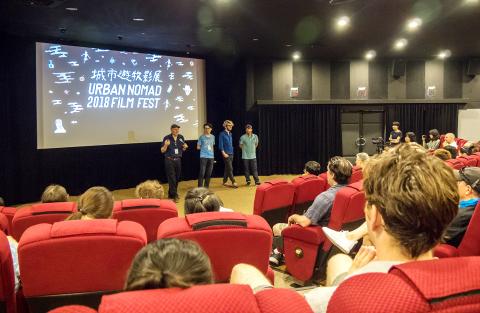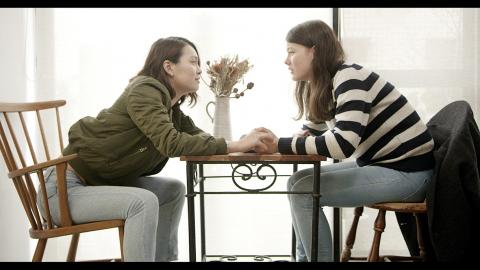There are certain facets of life in Taiwan that stand in particular relief to expats. A mention of garbage truck music or the humidity is sure to conjure a knowing laugh or story, and help build the foundation for a sense of community.
For the screenwriters of Filmmaker Nights Taipei: Short Film Development Project, these topics provided the perfect starting point to move the conversation beyond the music.
“Everyone has their own story about the garbage truck music,” said Chris Lanning, writer of Chancy’s Big Night, one of the four shorts screened exclusively as part of the Urban Nomad Film Festival last month in Taipei.

Photo: Kayleigh Madjar, Taipei Times
Lanning’s story is based on his first hour in Taiwan. While chatting on the phone with his parents, the Beethoven-blaring garbage trucks drove by.
“My mom asked me: ‘Can you turn your music down?’” he said at the screening, the audience laughing along and sharing knowing glances.

Photo courtesy of Aurelien Jegou
CHANCY’S BIG NIGHT
Chancy’s Big Night takes the status this Taiwan quirk holds in the expat imagination and blows it up to grandiose proportion. Chancy (Paul Batt) is an “unknown composer of known compositions,” who shares with the mockumentary-style camera his self-proclaimed genius and exasperation with his student’s blank stares. When the Taipei City Council gives him a chance to conduct an orchestra, he proudly puts on his best clothes, to his wife’s rolling eyes, and stands outside his front door, earnestly conducting the garbage truck to the orchestral music in his head.
The absurd contrast of the electronic tunes with a lovely score played by Brian Kuo (郭世楷) and other Taipei American School students, was no doubt funny, but also hit a sensitive note about a feeling of stagnation shared by many expats.
Tobie Openshaw, director and event organizer, said that it is often difficult for foreigners to create films because “we are not foreign enough to get outsider funding and not local enough to get local funding,” in addition to the myriad other resources and community required for creative and other endeavors. Many people then become stuck and either give up their creative inclinations or find themselves discontent with the scope of their reach.
Chancy is an extreme version of the latter, a man who is convinced of his talents, but has no outlet other than to teach and write as an “unknown.” The result is an absurd juxtaposition of the ideal and the everyday, Chancy himself willingly giving into the illusion.
Watching Chancy conduct without the workers skipping a beat feels like a pointed warning against complacency and the trap of ego without a mirror, while achievement continues to elude.
The next two shorts had equally salient — albeit less abstract — points to make about foreigner anxieties: the family introduction and the looming possibility of having to leave.
UNCLE BUDDY
Uncle Buddy opens with three of Aunt Patty’s (Sherry Lin) family members staring into the camera. They soon pull her aside to demand in hushed tones how she has the nerve to bring home her new boyfriend, who is black.
Director William Chen (陳惟元) places the camera in Buddy’s (James Thomas) shoes, eliciting the same anxiety any outsider would feel entering this private space, eager to make a good impression, but knowing he will have to fight an uphill battle.
Yet this “soul man,” is up to the task. The short ends with a departing Patty separated by the threshold, looking in at her three relatives, who insist that Buddy stay as their guest.
The story sends a gentle message that being yourself and showing kindness will often be returned. Indeed, Patty’s disparaging remarks to her family were returned with the kind of rejection that Buddy had originally feared.
TOO SWEET
Director Aurelien Jegou’s camera had the most to say in Too Sweet, as the characters had trouble saying anything at all.
The scenes flip between jagged handheld shots of a woman running through the streets of Taipei and moments of stillness as Lynn (Huang Tai-li, 黃台禮) and Julie (Jessica Chen, 陳文怡) share tender, pained silences.
In their first scene together, only Lynn’s face is visible as she struggles to utter the words: “I have to leave.” On their last night together, Lynn says “I love you” before Julie coldy replies: “You should get ready for bed. You have a long day tomorrow.”
The woman running was Julie, desperate to catch Lynn before she left. She stops around the corner, out of breath as Lynn’s car pulls away, a moment of heartbreak as the audience realizes she is too late, but in the final moments, Lynn pulls a note from her pocket and reads the words she had hoped to hear.
Building relationships in a place that is transitory is a tricky business, as the specter of leaving hangs overhead. So many choose to keep a modicum of distance to preempt the pain, but Too Sweet encourages depth of feeling, even if brief. Just as Uncle Buddy offered a vision of acceptance, Too Sweet, swings an arm around those who fear losing everything they have built here and tells them it will always be worth it.
DARK WEB
At first glance, the final short seemed to diverge from the rest. Dark Web, a thriller about a screenwriter named Tom (Sascha Heusermann) who, while researching the depraved parts of the Internet for a screenplay, inadvertently gives a murderer control over his computer. The killer then forces Tom to watch his girlfriend’s death before his own is broadcast. Although the short does not seem to have much to say about the expat experience in Taiwan, placed alongside the others, it served as a practical illustration of the fears dramatized earlier.
If Chancy’s Big Night was a call to action for creatives, then author and lead actor Heusermann heard it loud and clear. He wrote the screenplay based on a dream he had and set to work to realize that vision. He found a Taiwanese production company and pushed forward with pre-production. However, with the film already well on its way, a disagreement about rights (the company wanted full ownership) forced the production to stop. The Filmmaker Nights project provided a means to complete the project, even if it fell short of his dream.
Heusermann’s journey offers an example of Openshaw’s opening lament. Foreigners have stories to tell, but the means are scarce, and many are left to conduct the music only in their minds.
No one in the cinema, however, left with a feeling of stagnation, as the four films provided an antidote. Granted, the results were rough — the inevitability of two days of shooting each and limited editing time — but there they were, projected on the screen in front of a sympathetic audience with ideas of their own.
And these ideas will be given a chance to be realized next year, as Filmmaker Nights plans to collaborate with the festival again and produce another set of shorts. The opportunity will also be given to first-time directors to take the helm.
If next year is too long to wait, the 48-hour film project is coming up (likely in October), for which Filmmaker Nights will be fielding a team and encourages participation.
These small, but spirited projects show that expats are bursting with the desire to show this little community that they are not alone in their struggles, or simply that a little community is there, built on garbage trucks and knowing glances.
Due to the nature of the project and regulations governing the shorts’ future festival lives, only Chancy’s Big Night and Too Sweet are available for temporary online viewing.

Growing up in a rural, religious community in western Canada, Kyle McCarthy loved hockey, but once he came out at 19, he quit, convinced being openly gay and an active player was untenable. So the 32-year-old says he is “very surprised” by the runaway success of Heated Rivalry, a Canadian-made series about the romance between two closeted gay players in a sport that has historically made gay men feel unwelcome. Ben Baby, the 43-year-old commissioner of the Toronto Gay Hockey Association (TGHA), calls the success of the show — which has catapulted its young lead actors to stardom -- “shocking,” and says

The 2018 nine-in-one local elections were a wild ride that no one saw coming. Entering that year, the Chinese Nationalist Party (KMT) was demoralized and in disarray — and fearing an existential crisis. By the end of the year, the party was riding high and swept most of the country in a landslide, including toppling the Democratic Progressive Party (DPP) in their Kaohsiung stronghold. Could something like that happen again on the DPP side in this year’s nine-in-one elections? The short answer is not exactly; the conditions were very specific. However, it does illustrate how swiftly every assumption early in an

Inside an ordinary-looking townhouse on a narrow road in central Kaohsiung, Tsai A-li (蔡阿李) raised her three children alone for 15 years. As far as the children knew, their father was away working in the US. They were kept in the dark for as long as possible by their mother, for the truth was perhaps too sad and unjust for their young minds to bear. The family home of White Terror victim Ko Chi-hua (柯旗化) is now open to the public. Admission is free and it is just a short walk from the Kaohsiung train station. Walk two blocks south along Jhongshan

Francis William White, an Englishman who late in the 1860s served as Commissioner of the Imperial Customs Service in Tainan, published the tale of a jaunt he took one winter in 1868: A visit to the interior of south Formosa (1870). White’s journey took him into the mountains, where he mused on the difficult terrain and the ease with which his little group could be ambushed in the crags and dense vegetation. At one point he stays at the house of a local near a stream on the border of indigenous territory: “Their matchlocks, which were kept in excellent order,